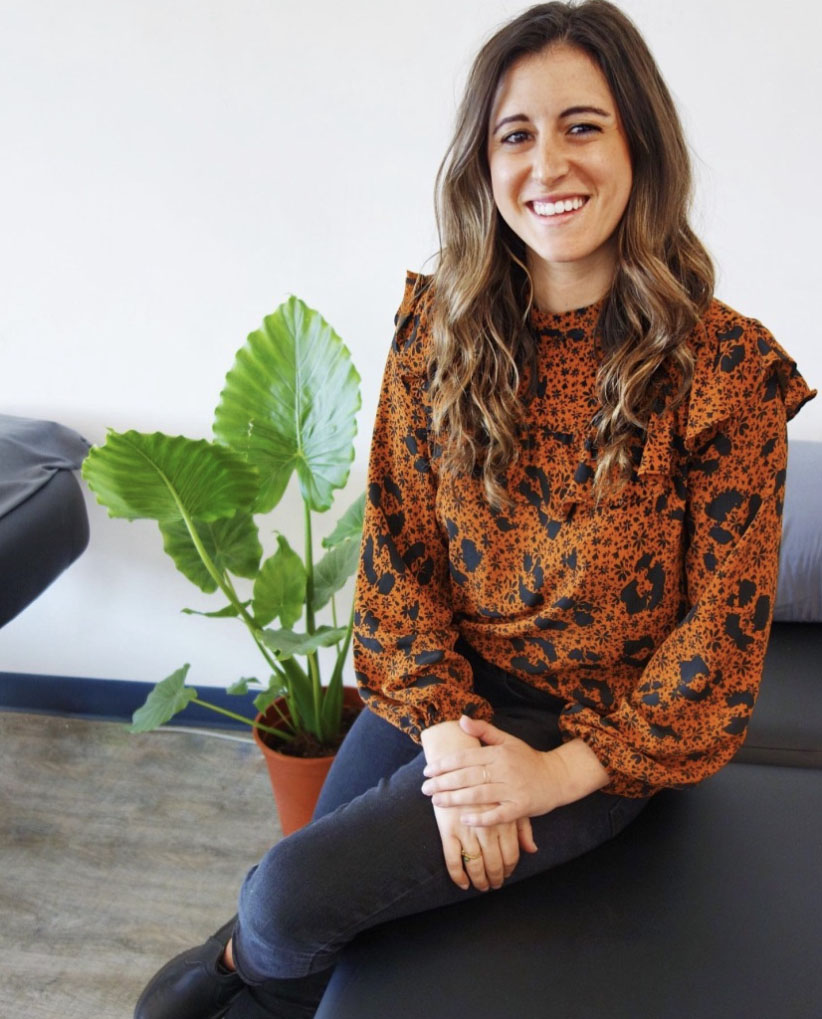November 2, 2020
A Community For The Spiritually Curious: Meet Alexandra Trevisan, Founder of Spiriosity
By Emily Merrell
I was raised with Jewish and Escopalian parents, so my spiritual upbringing was unique. Now as a 30-something, I’m not quite sure what I believe – nor do I see myself belonging to a particular institution. But I do consider myself spiritually curious! Enter Spiriosity, a community created by Alexandra Trevisan, for individuals like myself who have questions but want to learn more about religions and how they intersect with spirituality.

SDS: What is Spiriosity and what was your inspiration for creating it?
ALEXANDRA TREVISAN: You know that saying, “If you want to go fast, go alone. If you want to go far, go together”? On some level, without even realizing it, that has become a personal mantra for me. No matter where I found myself (entering college, studying abroad in Cape Town, or moving to the West Coast) I have always sought a deep sense of togetherness. I have been able to find community energy in each of these phases of life, spearheading gatherings, outings and trips. However, such energy was transient. Lasting effects of these efforts typically played out as individual relationships, never a genuine community bond.
Though I wasn’t consciously thinking about this proverb, I’ve always had a deep knowingness that “going together” is the Way (with a capital W for emphasis). As an adult, finding a sturdy, like minded community has been tough work. Especially in the midst of graduate school, a full-time job, going to the gym, or whatever it may be. This was a pain point for me. Why was it so hard to find a community that resonated to my core?
This is a 21st century problem – and not just for me. So, where was the solution? One of my biggest entrepreneurial role models, Miki Agrawal, posits these three questions to budding entrepreneurs: What is a pain point for me? Is this a pain point for many? Can I be passionate about this for a long time? With answering “yes” across the board, I ventured to create my own solution, did the inner “work” and eventually made that little venn diagram that highlights the overlap between my interests, values and skills. What was born in this little sector was Spiriosity.
Spiriosity is a digital community for those curious of all things spiritual. My venn diagram exposed my interests of spirituality and the supernatural world, my skills of “connecting the dots” (synthesizing information and relating it to various involved parties) and values of community and authenticity. Spiriosity is a place to cultivate deeper connection outside of organized religion. It’s the Build-a-Bear for spiritual communities. It’s like a potluck, where you get exposed to the infinite avenues of mysticism and spiritual study, choosing what resonates with you.
We are the yellow pages you are looking for when you seek deeper connection, but don’t know who to call. Sure, we all have our own mini communities and relationships. But I’m talking about that together in a metaphysical type of way. When the vibes are just right. Spiriosity is a place where we dissect the spiritual nature of all things, including ourselves. The only way to find a true tribe is to sharpen your own intuition and stay aligned to your own values. Spiriosity helps to facilitate this through conscious conversations and spiritual education. To feel truly connected and together, a sense of spirit is necessary.
To navigate my own spiritual self and find community, I didn’t want to have to dress in my Sunday best, or follow the cycles of the moon. Don’t get me wrong, there is a time and a place for both of these – if this is what tickles your spiritual fancy, then hell yeah. For me, the options to find a connected community seemed so polarized, with organized religion on the right and shamanistic alchemy on the left. That’s great, but how can I combine elements of both of these? Where is the middle ground?
I want a safe space to ask questions and talk about real shit. I want to find the spiritual message in Christianity, Buddhism and ancient Pagans. All of it! No limits. It all points to the same nonphysical spiritual energy. So, in an effort to go far together, Spiriosity was born. An intentionally created community and resource to foster deep connection with self, others and the world at large.
SDS: How did your childhood upbringing impact your relationship and interest in religion?
AT: I was raised in a Catholic home. Nothing was ever crazy religious, but we went to Mass and I went to Catholic elementary school. I honestly didn’t think much of it. During Mass I would memorize lyrics to songs or play games with my siblings. I never resonated deeply with Catholicism, I just kind of thought it was what people did. Looking back, I admire the ritualistic elements of Catholicism. I think curating such a ceremonial space (Sacraments, The Eucharist, etc.), allows for transcendental experiences.
However, the way in which Catholicism carried out their ceremonies was a little off from what my spiritual soul was looking for. Shifting over to public school for middle and elementary school (in North Carolina), I was surrounded by a lot of “Christians”. This term is related to Methodists, Baptists, Presbyterians and so on. I did things like Young Life, where going to some sort of youth event was a blend of religious and social.
I enjoyed that these events weren’t as “serious” as Mass, and included a social aspect, but I still couldn’t fully resonate with the message. On both the Catholic and Southern Christian side, I never felt capital “C”, Connected. Looking back, it seems that I didn’t feel a strong sense of authenticity from either community. That doesn’t mean that these communities weren’t authentic – their truth simply didn’t match my truth. The way in which I wanted to experience the nonphysical energy (i.e. vibes) of life, was not what these communities had to offer.
Feeling like a square peg trying to fit in a round hole, I began to internally assess these communities. It appeared to me that people participated in these social structures because it was what they were supposed to do. Nobody was questioning why women weren’t allowed to be priests, or why if you weren’t a follower of Jesus, you went to Hell (wtf?!) Like damn, these rules seem super random and not logical – but I am the weirdo for pointing this out? My passion in this arena of religion and spirituality started out as one of aversion. Why can’t you ask these questions? There literally is not an answer to these questions. People didn’t even want to talk about the plausibility of why these rules were in place. Curiosity was obsolete.

This perplexed to the point of Atheism. I resorted to the reasoning that religion was merely a psychological mechanism to cope with existential dread. I could not understand the disconnect from religion’s rules and human reasoning. Or why people were not curious about other religions. The only reason anyone practiced their religion was because of where they were born. If they were born in India, they would likely be Hindu. If they were born in Tunisia, they would likely be Muslim. I was beyond confused at the clinging to “The Word of God” without assessing the other options out there for themselves.
Moreover, the energy of self-righteousness that came with being a devout follower of the Lord was overwhelming. It was a classic “othering”. I believe in Jesus, so I am going to heaven. You don’t believe in Jesus, so you’re not going to heaven. I am A and you are B (with a not so subtle undertone that A is better than B). The cognitive dissonance of loving your neighbor as yourself and treating your neighbor like an inferior bewildered me. Now, I know in explaining this I am communicating my own energy of superiority and othering to this group of zealots in the South.
At the time, I was guilty of this as well. However, there is no other way to express my deep seeded passion for the study of religion and spirituality than to tell this story based on emotional memories. It started from a place of repugnance, which evolved into pioneering my own path to innovate the field. Love and hate are two sides to the same coin.
It wasn’t until college where I took a Buddhism class as part of my liberal arts curriculum that my interest in religion peaked again. Only this time, in a positive light. I was fascinated with every ounce of this course. On a subconscious level, my inner being was happy that I finally connected to the nonphysical spiritual power once again, although this time, through a different lens completely. This compulsion toward the field eventually led to a degree in psychology and the academic study of religion. Two realms I find inextricably intertwined. Formal education in these fields gave me an academic platform to work from when examining religion: how it works in society and how it is related to human behavior. Little did I know, these were seeds that would be slowly fertilized to become my passion project: Spiriosity.
SDS: As a religion major in college, what aspect of religion were you most curious by and/or shocked by?
AT: I took a class called “Religion, Magic, and Science” which changed my paradigm of thinking about religion. This was the good stuff. Where my polytheistic ancestral roots met mother nature and contemporary practice. I knew I was onto something when the academic study of religion combined all of this. It wasn’t a pigeonholed approach to explaining existence – all historical evidence of the supernatural was considered. This facilitated my curiosity about the parallels between different religious dogmas.
It is fascinating to me that scripture from Eastern and Western ideologies translate similar, if not the same, messages. Understanding the underlying similarities between different religions requires discernment and abstract thinking. I thank my education for this every day. The ability to “zoom out” when discussing topics as heavy as religion is essential. What shocks me is that I am equally as curious about the contrast between different religions. Specifically, I am curious about how different religions in different parts of the world have laid the groundwork for different paradigms of thinking.
For example, Eastern cultures value adaptability as a fundamental pillar of strength, stemming from Daoist principles of change and fluidity (yin and yang). Meanwhile, Western cultures value structure and rigidity as a fundamental pillar of strength, stemming from the chiseled, rigorous physique of Greek and Roman gods. One of my podcast episodes discusses this specifically. The more I learn, the more curious I am about comparing and contrasting everything in the realm of religion, including spiritual sects, ancient mythology, indigenous practices and cultural rituals.
SDS: What’s the biggest misconception people have about religion and spirituality?
AT: That religion and spirituality is something outside themselves. Anything can be spiritual or religious. It simply has not been communicated to us in this way. We think that we must go to church or burn sage to be connected to religion or spirituality. This is false. Washing your face can be a ceremonial gift of love and devotion to yourself. Walking your dog can be ritualistic and highlight the interconnectedness of man, nature, and animals.
It’s all about taking the time and connecting to what serves YOU specifically in a spiritual way. Spiriosity intends to help with this process. Navigating your own spiritual identity can be difficult, especially without a spiritual community to lean on. We have created a spiritual archetype quiz to help get the conversation going. Find out your archetype here.

SDS: Not only does Spiriosity host events but you are also hosting a podcast. Tell us about your podcast and the guests you bring on?
AT: In the past, podcast guests have been PhDs in the academic study of religion. This was my portal of entry into the realm of spirituality: discussing religion as literature and history, not necessarily as objective truth. I think it is important for everyone to engage with religion in this way at some point, to understand the metaphorical language utilized in sacred texts. Now, Spiriosity is expanding its guestlist to anyone with personal expertise that relates to religion, spirituality and the metaphysical. Topics such as “Psychedelics as Medicine” and “Sustainability as Karmic Duty” are examples of how podcast episodes will indirectly incorporate spirituality.
The idea of the podcast is to expose individuals to think in more spiritual terms. We have coined the phrase “Spiritual Virtues” and created an infographic to organize the fundamental principles of spiritual work. Each podcast conversation relates back to one or more of the spiritual virtues which is explained further in the show notes and on our Instagram. For more information on the Spiritual Virtues, check out this blog post.
SDS: What can we expect for the future of Spiriosity?
AT: Be on the lookout for digital and in person events to attend and participate in. Check out our next events here. Post COVID, Spiriosity plans to host dinner parties and soirées, exemplifying how the most mundane tasks can be carried out whimsically and spiritually. Spiriosity also plans to host online courses and coaching to develop deeper connections to your own spiritual strengths and weaknesses.
Finally, Spiriosity plans to forge a new path in examining cultural spirituality. This means taking our business abroad and exploring the ritualistic behaviors of different cultures – while further understanding what “sacred” means depending on where you are in the world. Stay tuned.

